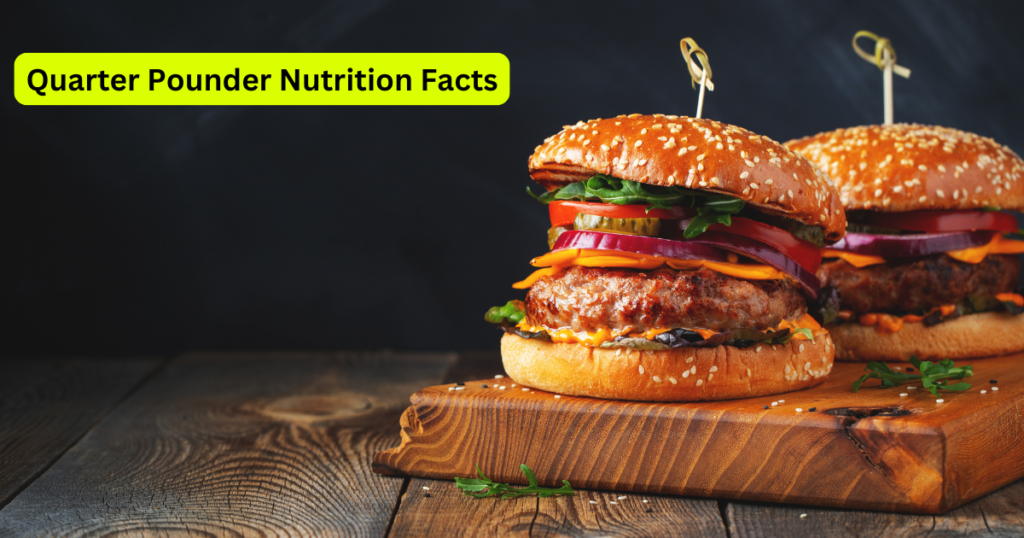The McDonald’s Quarter Pounder is one of the most iconic items on the fast-food giant’s menu, offering a satisfying mix of beef, cheese, and condiments on a sesame seed bun. While it’s a popular choice, understanding the nutrition facts behind this beloved burger is important, especially for those watching their diet or caloric intake.
Overview of the Quarter Pounder

The Quarter Pounder with Cheese contains a patty made from 100% beef, along with a sesame seed bun, American cheese, ketchup, mustard, onions, and pickles. Each of these components contributes to the overall nutritional profile of the sandwich, making it both high in calories and a rich source of fats and proteins.
Nutritional Breakdown (Standard Quarter Pounder with Cheese)
Here is a typical nutritional summary based on available data from McDonald’s and other resources:
- Calories: 520 kcal
- Total Fat: 26g (40% DV)
- Saturated Fat: 13g (65% DV)
- Trans Fat: 1.5g
- Cholesterol: 90mg (30% DV)
- Sodium: 1190mg (50% DV)
- Carbohydrates: 41g (14% DV)
- Dietary Fiber: 2g (8% DV)
- Sugars: 10g
- Protein: 30g (60% DV)
- Calcium: 25% DV
- Iron: 25% DV
These figures are based on a 2,000-calorie daily diet, with percentages indicating the Daily Value (DV) for the average adult(McDonald’s)(FastFoodNutrition.org).
Components Breakdown
Beef Patty
The Quarter Pounder’s patty weighs 4 ounces before cooking and is made from USDA-inspected, 100% beef, without fillers or extenders. The patty alone has approximately 250 calories, with 16g of fat (7g of which are saturated fats). It also provides 19g of protein, making it a high-protein food choice(Eat This Much).
Cheese
The cheese used in the Quarter Pounder is American cheese, which adds around 50 calories, along with a significant portion of the burger’s fat and sodium content. It contributes to the overall creamy, savory flavor of the sandwich but adds saturated fats that should be limited in a balanced diet.
Bun
The sesame seed bun contains about 150 calories, adding carbohydrates to the meal. It’s enriched with essential nutrients like iron and folic acid but also contributes sugars and sodium(FastFoodNutrition.org).
Condiments
The ketchup, mustard, onions, and pickles may seem insignificant but are important for flavor. They add small amounts of calories, sugars, and sodium. The pickles contain potassium sorbate as a preservative, while the mustard contains spices like turmeric and paprika(McDonald’s)(FastFoodNutrition.org).
Quarter Pounder Variations
Double Quarter Pounder with Cheese
If you’re looking for a heartier option, the Double Quarter Pounder with Cheese adds an extra beef patty, making it significantly higher in calories (around 740 kcal), fats (42g), and protein (48g). It’s a protein-packed meal but also brings the fat and sodium content to much higher levels, which may be a concern for those managing their cholesterol or blood pressure(Eat This Much).
Quarter Pounder without Cheese
For those wanting a slightly lighter version, the Quarter Pounder without cheese contains fewer calories (approximately 417 kcal) and reduces the fat content to about 22g. Removing the cheese also cuts down on saturated fats and sodium(FastFoodNutrition.org).
Health Considerations
The Quarter Pounder is undoubtedly a filling and delicious meal option, but there are some considerations for those focused on health and nutrition:
- High in Saturated Fats: With 65% of the daily recommended saturated fat intake in one sandwich, it’s essential to monitor fat consumption throughout the day when eating a Quarter Pounder.
- High Sodium Content: With over 50% of the daily recommended sodium intake, this burger can contribute to high blood pressure if consumed frequently. Reducing other salty foods on the same day can help balance sodium levels.
- Protein Boost: The 30g of protein in a single sandwich is excellent for muscle maintenance and overall energy. For athletes or individuals on high-protein diets, this can be a significant advantage(FastFoodNutrition.org)(Eat This Much).
Caloric Considerations for Different Diets
Weight Management
For those focused on weight management, the Quarter Pounder may be a higher-calorie option, especially considering the portion sizes of additional sides like fries or sodas. Opting for water or a salad as a side can help manage calorie intake. The burger alone accounts for more than 25% of a typical 2,000-calorie daily diet.
Low-Carb and Keto Diets
The high fat and protein content in the Quarter Pounder might make it more suitable for low-carb or ketogenic diets, particularly if the bun is removed. This would drop the carbohydrate count significantly, bringing it in line with such diets’ requirements(McDonald’s).
Conclusion
The McDonald’s Quarter Pounder with Cheese is a beloved fast-food item, offering a satisfying balance of beef, cheese, and condiments. While it’s high in calories, fats, and sodium, it can still be enjoyed as part of an overall balanced diet, especially if paired with healthier side options or consumed in moderation. Whether you’re indulging in the classic version or customizing it to fit dietary preferences, the Quarter Pounder remains a cornerstone of fast-food culture.
Read More
Frequently Asked Questions (FAQ)
1. Is the Quarter Pounder a healthy choice?
While the Quarter Pounder is high in protein, it also contains a significant amount of saturated fats and sodium, which should be consumed in moderation. It’s not the healthiest option for those on a low-fat or low-sodium diet but can be enjoyed occasionally as part of a balanced diet(McDonald’s).
2. How many calories are in a Quarter Pounder with Cheese?
A standard Quarter Pounder with Cheese contains around 520 calories(FastFoodNutrition.org)(Eat This Much).
3. How much protein is in a Quarter Pounder?
A Quarter Pounder provides 30g of protein, which is 60% of the recommended daily value for the average adult(FastFoodNutrition.org).
4. Does the Quarter Pounder contain any allergens?
Yes, the Quarter Pounder contains gluten, milk, soy, and wheat. It does not contain eggs, fish, peanuts, shellfish, or tree nuts. However, McDonald’s uses shared equipment, so cross-contact with allergens is possible(McDonald’s)(FastFoodNutrition.org).
5. Can I eat a Quarter Pounder on a low-carb diet?
Yes, removing the bun can make the Quarter Pounder more suitable for low-carb or keto diets, as this reduces the carbohydrate count to about 5g(FastFoodNutrition.org).